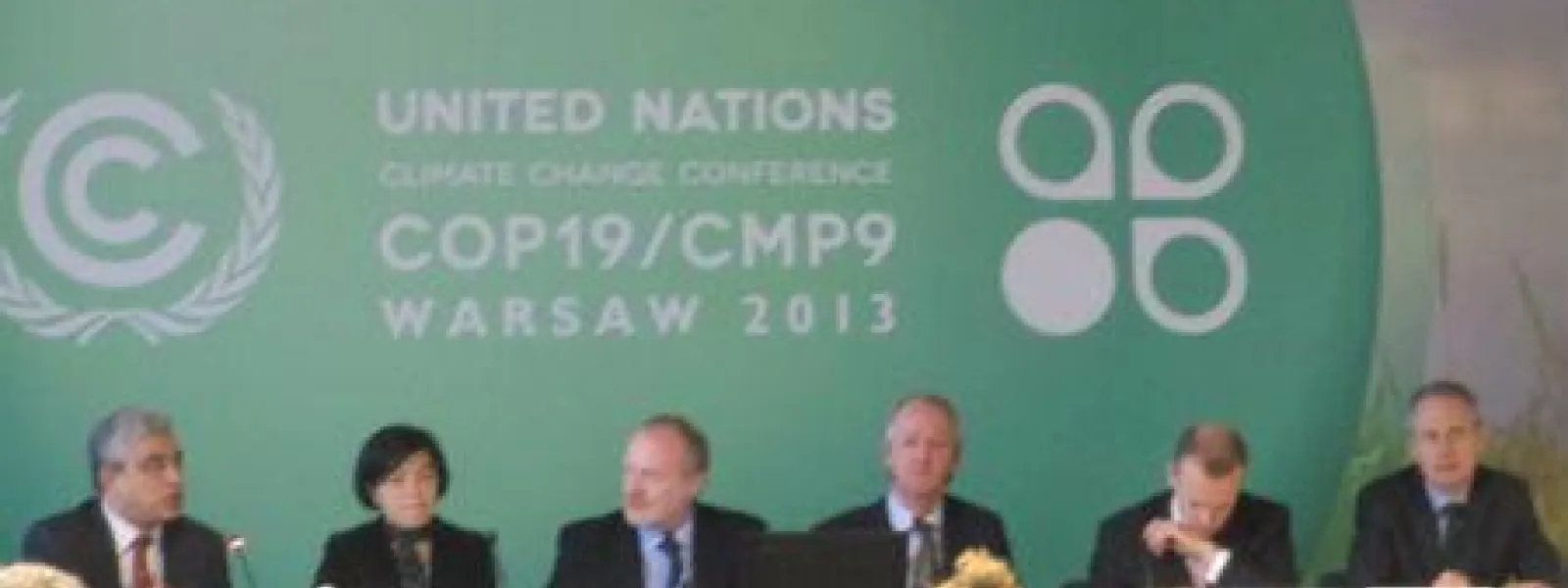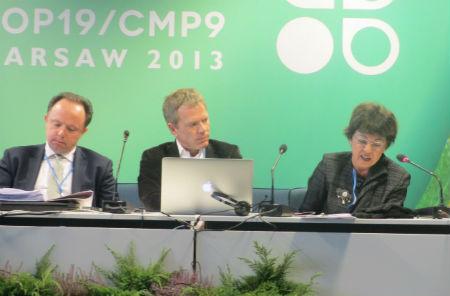
Green financing: Sources, preparation and the allocation of resources
Credit: Andrea RodríguezBy Andrea Rodríguez, legal advisor, AIDA,@arodriguezosuna, and Mónica Valtierra, AIDA volunteer
Warsaw, Poland. The financing needed to fight climate change was a key issue at the side events of the Warsaw Climate Change Conference (COP19). Discussions dug deep into the issues of the sourcing of funds, the preparation to secure financing and how to turn financial support into real solutions.
persifying the financial resources of the Green Climate Fund (GCF)
The World Business Council for Sustainable Development (WBCSD) and the Climate Markets and Investment Association (CMIA) organized an event to discuss the theme of financial persification and the tools necessary to mobilize GCF funds.
Giles Dickson, vice president of environmental policies and global advocacy at the multinational energy and transport conglomerate Alstom, said that for the private sector to provide capital, the GCF needs mechanisms for providing incentives and a framework for making investments through loans.
It is important to break the myth that the private sector will use public resources to its own benefit, given that the true intention is to contribute to financial instruments in which the public sector is involved, he said.
Jeanne Ng, director of environmental affairs at Hong Kong-based electric company CLP Group, said the private sector already has financed renewable energy projects without public resources. For this reason, she said it is important for the GCF to take into account these efforts and include them within its objectives, and also to make sure that public resources don’t go to projects that already are getting financing.
Talking about the inclusion of the private sector in funding GCF investments, Ng said the Fund needs the help of private institutions to market low-carbon products.
Vikram Widge, head of climate finance and policy at the International Finance Corp. (IFC), the private sector arm of the World Bank, said the GCF must play a participative role in capitalizing financial resources and generating profits. The financial instruments must guarantee the stability of private resources and the development of countries, he said.
Alstom’s Dickson said private sector participation could come through three channels: in projects on the local and municipal level, in promoting new technologies and through the development of projects supported by private companies. This will only happen if governments put in place economic policies that guarantee positive results, he said.
Readiness support
The question of readiness support was the focus of discussion at another side event called Rolling up the sleeves for the Green Climate Fund: Expectations and experience from building GCF readiness, where representatives from different countries expressed their views:
South Africa. Zaheer Fakir, chief policy advisor at South Africa’s Department of Environmental Affairs, said it is important to have a leader country to run the Fund’s projects, some of which are designed for specific environmental problems. There are solutions that cannot be replicated in each country because they rely on the institutional capacity of each country, he said.
It’s not just about giving money to national entities. This is because there are concerns of money-laundering and also because some entities already have direct access to financial resources. The funding must go to projects that have the potential for transformation and for which the end goal should not be exclusively limited to the reduction of greenhouse gas emissions, he added.
On the same topic, Richard Calland, an associate professor of public law at the University of Cape Town, presented a study on the preparation capacity of each country. It mentioned three indispensible prerequisites: the country must be relative, responsive and reasonable. In identifying the local difficulties in terms of planning, he proposed that each country form financial partnerships with research institutions. This is not about the ability to deploy financial resources, but rather to use the maximum capacity possible, he said. Lastly, on the subject of access of financial resources, he called on people to consider the possible modalities, fiduciary standards and safeguards.
Germany. Norbert Gorben mentioned that Germany is considering the possibility next year of participating in the GCF and contributing to it 14 billion Euros through bilateral schemes and multilateral organizations. He said the Fund’s board should ask the GCF Secretariat to begin action on implementing programs and mobilizing resources as soon as possible. Ina von Frantzius, a policy advisor on climate policy and financing at the Federal Ministry for Economic Cooperation and Development, said Germany wants to offer specific help to each country that needs it.
Peru. Gabriel Quijandria, vice minister of the strategic development of natural resources at the Ministry of the Environment, said that together with the Ministry of Finance he is working on a program to modernize the state. The two ministries have discussed establishing a national body charged with implementing and managing the country’s funds once the GCF starts to operate.
The preparation for the program, he said, was not an easy concept to fathom, but one that requires the right attitude. In order to define the program, it is necessary to understand and pay attention to the perspective of poor communities, he said. As an example, he cited farmers who take out international insurance against the effects of climate phenomena such as El Niño.
The allocation of resources
The financing of projects by the Global South to countries in the Global South is a growing trend in the developing world. In most cases, the resources come from the private sector in these countries and are funneled to projects related to public policy. This issue was addressed at another side event at the COP19 in Warsaw called Developing Countries in the Driving Seat for Accelerating Green Finance.
On this topic, Monique Barbut, head of the United Nations Convention to Combat Desertification (UNCCD), said the priority is to know exactly where the money goes. Some 60% of the financial resources for climate projects come from the private sector, with a large part of this money going toward renewable energy projects. This is not yet enough to combat climate change. Approximately 48% of government funds are allocated to adaptation projects related to sustainable use of the land, she said.
On the importance of resource allocation, she clarified that this depends on the generation of social benefits. Funding sustainability projects can lead to less migration, poverty and insecurity for vulnerable communities, she explained.
Zaheer Fakir, the representative of the South African government, also spoke about leadership. In his opinion, countries in the Global South are more interested in doing more to combat climate change than the countries in the Global North, and so they are more open to the idea of offering their money to help. “We cannot sit and wait for the multilateral process to be agreed upon” because it is now when countries are suffering extreme poverty, unemployment, uneducated youth and other problems that impel us to go home and do something about it rather than wait around.
“How can we improve the lives of our citizens at home?” asked Fakir. It is a question of “being green,” of involving communities, indigenous groups and all levels of society in green projects, he said.
More than the source of funding , it is important that money is invested in the adequate technology for resolving climactic problems in a country, said Nick Beglinger, president of Zurich-based clean technology business association Swisscleantech. Businesses can make money while also helping the environment, he said.
He added that it is also necessary to start innovating in green finance. He suggested reviewing the use of the public money in pension funds in order to reach the common goals of the government and society, because pensioners are the ideal investors for long-term plans. On this issue, there is not much difference between developed and developing countries, he said, adding that the pisions between the Global South and North should be eliminated in order for the financing mechanisms to function in an efficient way regardless of the origin of the funds.
